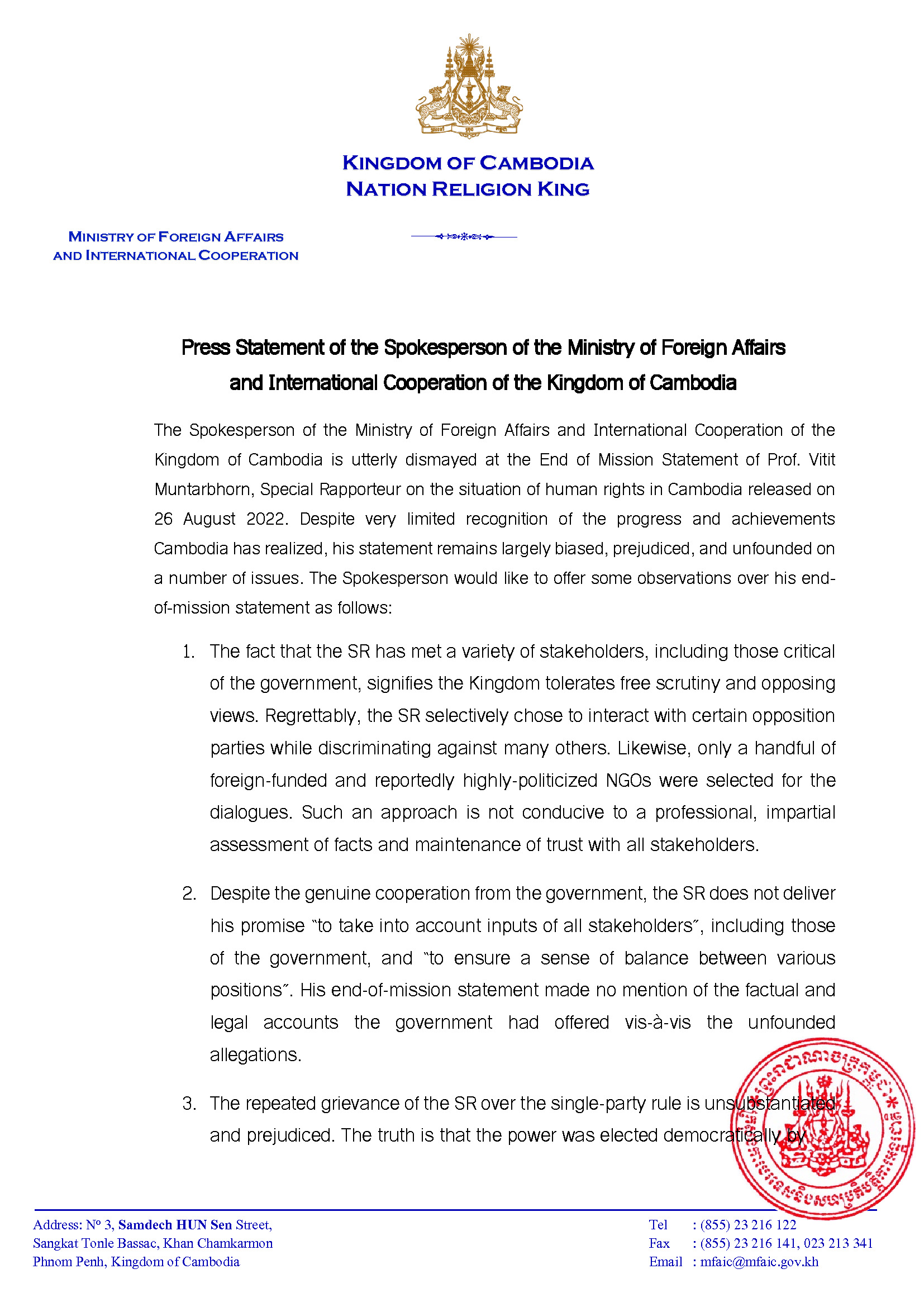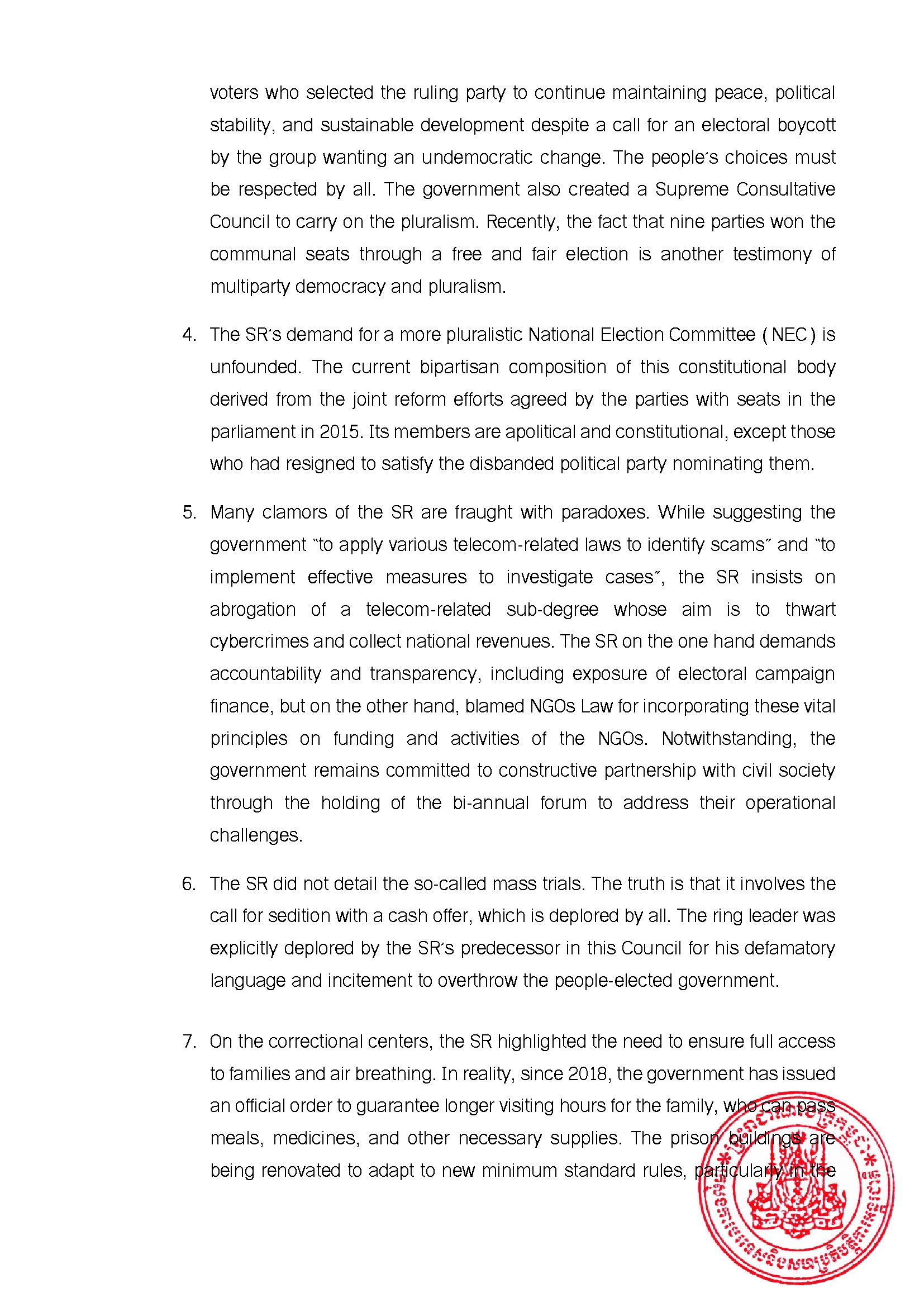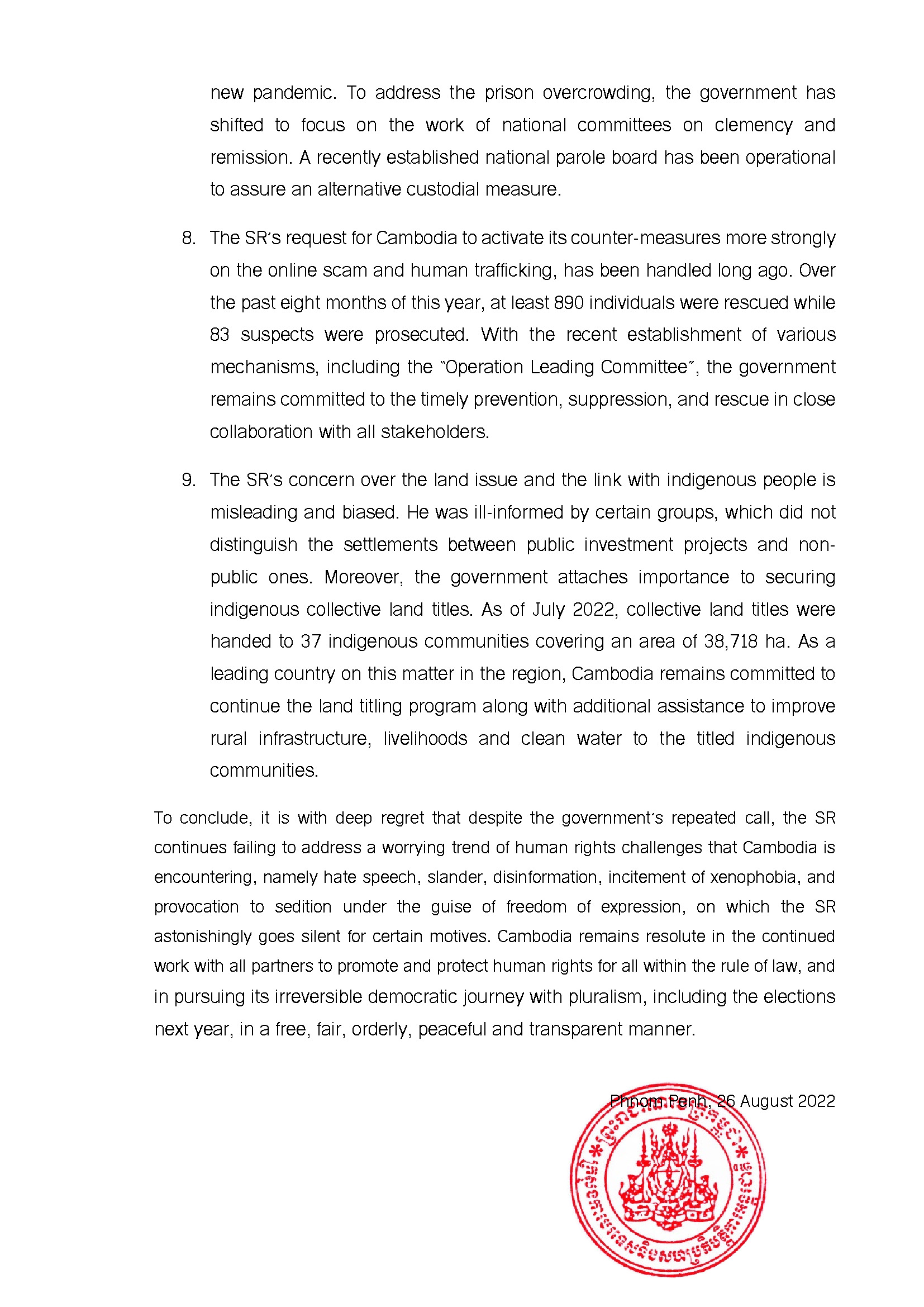PHNOM PENH: The Spokesperson of the Ministry of Foreign Affairs and International Cooperation of the Kingdom of Cambodia has issued a press statement expressing Cambodia's disappointment with the Mission Statement from the UN special rapporteur on the situation Cambodia’s human rights. The spokesman released a statement last night.
The Spokesperson of the Ministry of Foreign Affairs and International Cooperation of the Kingdom of Cambodia Prof Vitit Muntarbhorn is utterly dismayed at the Mission Statement from the Special Rapporteur on the situation of human rights in Cambodia released on 26 August 2022. Despite very limited recognition of the progress and achievements Cambodia has realized, his statement remains largely biased, prejudiced, and unfounded on several issues. The Spokesperson would like to offer some observations over his end-of-mission statement as follows:
1. The fact that the Special Rapporteur has met a variety of stakeholders, including those critical of the government, signifies the Kingdom tolerates free scrutiny and opposing views. Regrettably, the Special Rapporteur selectively chose to interact with certain opposition parties while discriminating against many others. Likewise, only a handful of foreign-funded and reportedly highly-politicized NGOs were selected for the dialogues. Such an approach is not conducive to a professional, impartial assessment of facts and maintenance of trust with all stakeholders.
2. Despite the genuine cooperation from the government, the Special Rapporteur does not deliver his promise “to take into account inputs of all stakeholders”, including those of the government, and “to ensure a sense of balance between various positions”. His end-of-mission statement made no mention of the factual and legal accounts the government had offered vis-à-vis the unfounded allegations.
3. The repeated grievance of the Special Rapporteur over the single-party rule is unsubstantiated and prejudiced. The truth is that the power was elected democratically by voters who selected the ruling party to continue maintaining peace, political stability, and sustainable development despite a call for an electoral boycott by the group wanting an undemocratic change. The people’s choices must be respected by all. The government also created a Supreme Consultative Council to carry on the pluralism. Recently, the fact that nine parties won the communal seats through a free and fair election is another testimony of multiparty democracy and pluralism.
4. The Special Rapporteur’s demand for a more pluralistic National Election Committee (NEC) is unfounded. The current bipartisan composition of this constitutional body derived from the joint reform efforts agreed by the parties with seats in the parliament in 2015. Its members are apolitical and constitutional, except those who had resigned to satisfy the disbanded political party nominating them.
5. Many clamors of the Special Rapporteur are fraught with paradoxes. While suggesting the government “to apply various telecom-related laws to identify scams” and “to implement effective measures to investigate cases”, the SR insists on abrogation of a telecom-related sub-decree whose aim is to thwart cybercrimes and collect national revenues. The Special Rapporteur on the one hand demands accountability and transparency, including exposure of electoral campaign finance, but on the other hand, blamed NGOs Law for incorporating these vital principles on funding and activities of the NGOs. Notwithstanding, the government remains committed to constructive partnership with civil society through the holding of the bi-annual forum to address their operational challenges.
6. The Special Rapporteur did not detail the so-called mass trials. The truth is that it involves the call for sedition with a cash offer, which is deplored by all. The ring leader was explicitly deplored by the Special Rapporteur’s predecessor in this Council for his defamatory language and incitement to overthrow the people-elected government.
7. In the correctional centres, the Special Rapporteur highlighted the need to ensure full access to families and air breathing. In reality, since 2018, the government has issued an official order to guarantee longer visiting hours for the family, who can pass meals, medicines, and other necessary supplies. The prison buildings are being renovated to adapt to new minimum standard rules, particularly in the new pandemic. To address the prison overcrowding, the government has shifted to focus on the work of national committees on clemency and remission. A recently established national parole board has been operational to assure an alternative custodial measure.
8. The Special Rapporteur’s request for Cambodia to activate its counter-measures more strongly on the online scam and human trafficking has been handled long ago. Over the past eight months of this year, at least 890 individuals were rescued while 83 suspects were prosecuted. With the recent establishment of various mechanisms, including the “Operation Leading Committee”, the government remains committed to the timely prevention, suppression, and rescue in close collaboration with all stakeholders.
9. The Special Rapporteur’s concern over the land issue and the link with indigenous people is misleading and biased. He was ill-informed by certain groups, which did not distinguish the settlements between public investment projects and non-public ones. Moreover, the government attaches importance to securing indigenous collective land titles. As of July 2022, collective land titles were handed to 37 indigenous communities covering an area of 38,718 ha. As a leading country on this matter in the region, Cambodia remains committed to continuing the land titling program along with additional assistance to improve rural infrastructure, livelihoods and clean water to the titled indigenous communities.
To conclude, it is with deep regret that despite the government’s repeated call, the Special Rapporteur continues failing to address a worrying trend of human rights challenges that Cambodia is encountering, namely hate speech, slander, disinformation, incitement of xenophobia, and provocation to sedition under the guise of freedom of expression, on which the Special Rapporteur astonishingly goes silent for certain motives. Cambodia remains resolute in the continued work with all partners to promote and protect human rights for all within the rule of law, and in pursuing its irreversible democratic journey with pluralism, including the elections next year, in a free, fair, orderly, peaceful and transparent manner.

























